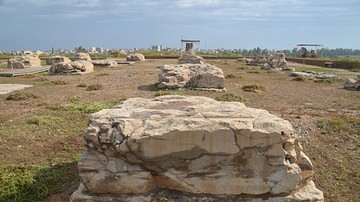Search
Did you mean: Darius I?
Search Results

Definition
Henry Lee III
Henry Lee III (1756-1818), more commonly known by his nickname 'Light-Horse Harry' Lee, was a cavalry officer in the Continental Army during the American Revolutionary War (1775-1783) and a politician who served as the ninth Governor of Virginia...

Definition
James III of Scotland
James III of Scotland reigned as king from 1460 to 1488. He succeeded his father James II of Scotland (r. 1437-1460) at the age of eight, which led to some nobles taking advantage of the king's minority and even abducting him. James was also...

Definition
Ancient Persian Warfare
The ancient Persian military evolved from the earlier armed forces of the Medes which, in turn, developed from the warrior class of the indigenous people of the Iranian Plateau, the Aryan migrants (including the Persians) who later settled...

Article
Bureaucracy in the Achaemenid Empire: Learning from the Past
In the early days of the Achaemenid Empire (c. 550-330 BCE), the kings came to realise that, if they were to be able to administer the vast mass of land and the multicultural people who inhabited it, they had to create an organizational system...

Definition
Hypaspist
The hypaspists or hypaspistai were a distinct type of infantry soldier who served as a vital part of the Macedonian armies of both Phillip II of Macedon (r. 359 BCE - 336 BCE) and his son and heir Alexander the Great (r. 336-323 BCE). The...

Definition
Artaxerxes II
Artaxerxes II (r. 404-358 BCE, also known as Artaxerxes II Mnemon) was the 10th monarch of the Achaemenid Empire (c. 550-330 BCE). He was the son of Darius II (r. 424-404 BCE) and Parysatis (who was Darius II's half-sister) and older brother...

Image
Palace of Darius in Susa
The foundations of the Palace of Darius the Great at Susa (Iran), the capital of Elam and of the Achaemenid Empire. The palace was built on a 12-hectare (29.6 acres) artificial platform and occupied five hectares (12.3 acres). It consisted...

Image
The Apadana of the Palace of Darius in Susa
The Apadana (audience hall) of the Palace of Darius in Susa (Iran) was a large hypostyle room of 36 columns. Measuring 109 metres (357 feet) on each side, it was very similar to that of Persepolis in plan and dimensions with distinctive Persian...

Video
Capital of a column from the audience hall of the palace of Darius I, Susa, c. 510 B.C.E.
Capital of a column from the audience hall of the palace of Darius I, Susa, c. 510 B.C.E., Achaemenid, Tell of the Apadana, Susa, Iran (Louvre)
Speakers: Dr. Steven Zucker & Dr. Beth Harris

Definition
Michael III
Michael III, also known as “Michael the Drunkard” by his detractors, was emperor of the Byzantine Empire from 842 to 867 CE. Never quite escaping the shadow of his mother Theodora, who ruled as regent in his name until c. 855 CE, or his uncle...